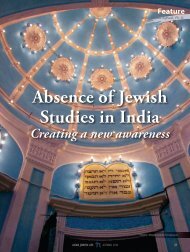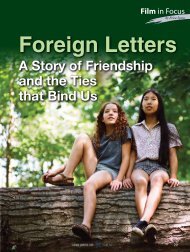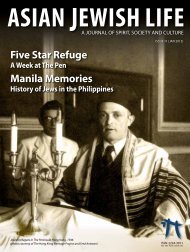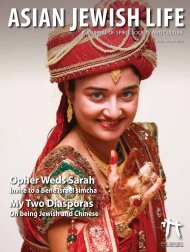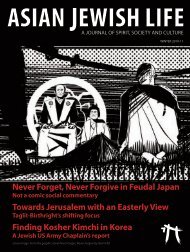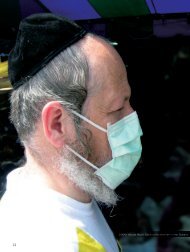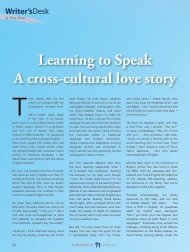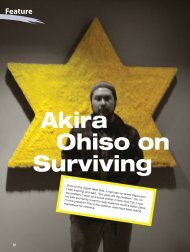Download PDFs of all articles - Asian Jewish Life
Download PDFs of all articles - Asian Jewish Life
Download PDFs of all articles - Asian Jewish Life
- No tags were found...
Create successful ePaper yourself
Turn your PDF publications into a flip-book with our unique Google optimized e-Paper software.
BookReviewsby Susan Blumberg-KasonEducation Comes FirstTiger Mothers, Chinese nationals and US schoolingOne <strong>of</strong> the most controversial books this year, Amy Chua’sBattle Hymn <strong>of</strong> the Tiger Mother (Penguin, 2011) is known forits portrayal <strong>of</strong> a strict mother who stresses academics andmusic above everything, including playdates, sports, andother extracurricular activities.But little has been made <strong>of</strong> the common Chinese-<strong>Jewish</strong> familydynamic Chua describes early on in her memoir. Accordingto Chua, this group “may sound exoticbut actu<strong>all</strong>y forms a majority in certaincircles, especi<strong>all</strong>y in university towns.”In her case, she and her husband agreeto teach their kids Mandarin and raisethem <strong>Jewish</strong>. Later in her memoir,Chua briefly recounts when her eldestdaughter, Sophia, has her Bat Mitzvah attheir home. At that time, Chua’s motherin-lawwas suffering from leukemia andliving with them. Holding the Bat Mitzvahat their home <strong>all</strong>ows grandma Popo toattend. She passes away two weeks later.It’s not until her younger daughter Lulugets ready for her own Bat Mitzvah thatChua discusses how she and her husband share in Lulu’sBat Mitzvah preparations. She writes “As with Sophia, wewere being unconventional and having the Bat Mitzvah inour home. Jed handled the major responsibilities, but Iwas the one constantly haranguing Lulu to practice herhaftorah portion—I was going to be a Chinese mothereven when it came to Hebrew.” (page 199)What makes Lulu’s Bat Mitzvah even moreunconventional is that Chua asks Lulu to perform“Hebrew Melody” on the violin at her Bat Mitzvah. And intrue Tiger Mother fashion, Chua pushes Lulu to perfection.Tensions rise so high that Chua isn’t sure Lulu will agree to play“Hebrew Melody” when she wakes up the morning <strong>of</strong> her BatMitzvah. Fortunately for Amy Chua, Lulu’s bat mitzvah goes<strong>of</strong>f without a hitch, but not without a tiger’s share <strong>of</strong> tension.As strict as Chua appears in Battle Hymn <strong>of</strong> the Tiger Mother,her original ideas about education and extracurricular activitiesstand in contrast to the intellectual elite in China 150 years ago.In Fortunate Sons: The 120 Chinese Boys Who Came toAmerica, Went to School, and Revolutionized an AncientCivilization (WW Norton, 2011), Liel Leibovitz and MatthewMiller chronicle the changing views <strong>of</strong> education in China inthe late nineteenth and early twentieth centuries.Their book opens with the annual Yale freshman-sophomorefootb<strong>all</strong> game in the f<strong>all</strong> <strong>of</strong> 1850. Freshman Yung Wing capturesthe b<strong>all</strong> toward the end <strong>of</strong> the game and runs like a typhoon,his long braided queue swaying as his Chinese robes fan inthe wind. He kicks the b<strong>all</strong> for a field goal, seizing a victory andfeels American for the first time.As Leibovitz and Miller write in Fortunate Sons, recreationalactivities become important to university education backin nineteenth century American universities. And it’sthis aspect <strong>of</strong> their education that makes such animpression on Yung Wing, the first person from Chinato study in the US.Yung Wing learns English in missionary schools inChina before embarking on his university years at Yale.But he flunks calculus and barely passes Greek while atYale. These subjects involve more critical thinking thansimply reciting the Confucian classics.After Yung Wing returns to China with an undergraduatedegree from Yale, he struggles to find a placein the country he left behind as ateenager. Eventu<strong>all</strong>y he moves backto Connecticut to supervise a group<strong>of</strong> 120 Chinese male high school anduniversity students in the late 1870s.The students sail to San Francisco,see firsthand how the Chinese built thetranscontinental railroads, visit importanthistorical cities, and then settle in to begintheir studies on the east coast.Fortune Sons tells the stories <strong>of</strong> thesestudents and their overseer Yung Wing <strong>all</strong> whilenarrating the rapid changes in late-Qing andearly-Republic China. As long as Yung Wing hassupport back in China, the study abroad programin the US is safe.Sadly, the mission is aborted prematurely after the program’spatron in China is stripped from his position <strong>of</strong> authority.Without another supporter and with increased anti-westernsentiment during the Boxer Rebellion, the program comes toa sudden halt. All students must return to China, although onestays back in the US to marry a local woman. But among thosewho return to China, many land in top government, military,and industry jobs.Leibovitz and Miller’s book is fascinating in that it shows how abalanced education, including physical education and criticalthinking, paved the way for modern China. And as Amy Chualearns at the end <strong>of</strong> her memoir, a well-rounded student is notsuch a bad thing after <strong>all</strong>.ASIAN JEWISH LIFE ISSUE 623



